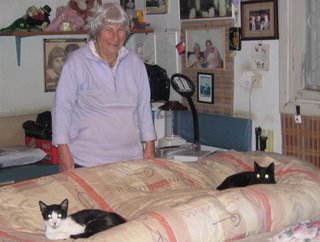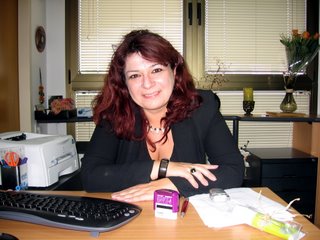
"Just as the sun's warmth, nutrients in the soil, and regular watering produce healthy sunflowers, so do the warmth of family and friends and the nurturing of a supportive community produce people — including those with mental illness — who contribute to society."
So speaks my American childhood friend, the mother of a 38-year-old daughter diagnosed with
schizophrenia more than twenty years ago, and, more recently, with
obsessive compulsive disorder (OCD).
It has been said that you can’t make old friends. One of my chief delights in bihemispheral living has been rediscovering decades later, in Israel, my childhood friend. During high school, we studied together at the Herzliah Hebrew Teachers Institute (merged with the Division of Judaic Studies, Touro College, NY). On our graduation from
City College of New York, she moved to Israel, and I to Cambridge, Massachusetts, each to marry and pursue postgraduate education and careers, and she to raise her children.
In 2002, when I launched my journey of
connecting with my roots, spending part of each year in the USA and part in Israel, I found my childhood friend! We eagerly shared life stories since we last met. And while we revealed more each successive meeting, she was guarded when describing her children.
Months later she allowed that one child had health problems. Several more months had passed when she added that the child had mental health issues. Gradually (I never asked or pried, just listened carefully), she told of her firstborn who by age 18 was an excellent student, a fashion-conscious teen with motivation, plans, and joy in life. And then, suddenly, their world seemed to collapse. Her child began to show a series of unexplained behavioral anomalies, severe anxieties, and depressions, and the family launched a terrifying frantic scrambling for diagnoses, treatments, and specialists.
And then came the shame. . . and the guilt, anger, and self pity, and feeling cheated and distraught by having to give up dreams and expectations. All these responses accompanied her need to cope with the stigma of mental illness. Even today, after 18 years of her child's and the family's rehabilitation, mentoring, struggles, and active involvement in
Enosh (the Israel Mental Health Association), my childhood friend didn't have to ask (though she did) that I respect her and her family's anonymity in this post.
Recently, my friend invited me to an Enosh-sponsored event in Tel Aviv. Israeli television personality Tzofit Grant introduced the evening in a dialogue with her brother, Amiram, who fell ill with schizophrenia 15 years ago at age 32. Tzofit explained that while she was at Amiram's side during periods that he stopped eating and announced that he was the Messiah, to the world she lied, "He is hospitalized on account of an auto accident." Tzofit shared that ten years passed before she "came out of the closet" and began to address the stigma.
A determined mood filled the meeting space where more than 200 people gathered, often shouting support for speakers' calls to —
- Break open the secret, come out of the closet of shame.
- Break down the prejudices and the fears in society.
- Provide these folks, the consumers — warmth, support, and rehabilitation.
Stigmas have no place in the modern world. My friend challenges us to "Eliminate the stigma so that these folks can move beyond the illness, develop the healthy parts of their personalities, and make positive contributions to society."





